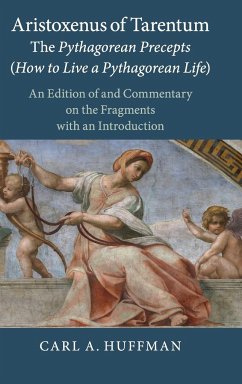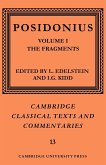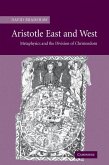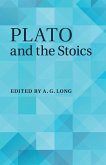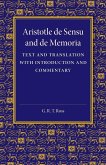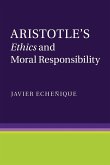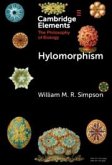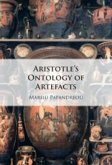Aristoxenus of Tarentum
The Pythagorean Precepts (How to Live a Pythagorean Life)
Aristoxenus of Tarentum
The Pythagorean Precepts (How to Live a Pythagorean Life)
- Gebundenes Buch
- Merkliste
- Auf die Merkliste
- Bewerten Bewerten
- Teilen
- Produkt teilen
- Produkterinnerung
- Produkterinnerung
The first detailed study of The Pythagorean Precepts, which present the Pythagorean way of life praised by Plato.
Andere Kunden interessierten sich auch für
![Posidonius Posidonius]() PosidoniusPosidonius74,99 €
PosidoniusPosidonius74,99 €![Aristotle East and West Aristotle East and West]() David Etc BradshawAristotle East and West51,99 €
David Etc BradshawAristotle East and West51,99 €![Plato and the Stoics Plato and the Stoics]() Plato and the Stoics33,99 €
Plato and the Stoics33,99 €![de Sensu and de Memoria de Sensu and de Memoria]() Aristotlede Sensu and de Memoria45,99 €
Aristotlede Sensu and de Memoria45,99 €![Aristotle's Ethics and Moral Responsibility Aristotle's Ethics and Moral Responsibility]() Javier EcheñiqueAristotle's Ethics and Moral Responsibility35,99 €
Javier EcheñiqueAristotle's Ethics and Moral Responsibility35,99 €![Hylomorphism Hylomorphism]() William M R SimpsonHylomorphism78,99 €
William M R SimpsonHylomorphism78,99 €![Aristotle's Ontology of Artefacts Aristotle's Ontology of Artefacts]() Marilù PapandreouAristotle's Ontology of Artefacts119,99 €
Marilù PapandreouAristotle's Ontology of Artefacts119,99 €-
-
-
The first detailed study of The Pythagorean Precepts, which present the Pythagorean way of life praised by Plato.
Hinweis: Dieser Artikel kann nur an eine deutsche Lieferadresse ausgeliefert werden.
Hinweis: Dieser Artikel kann nur an eine deutsche Lieferadresse ausgeliefert werden.
Produktdetails
- Produktdetails
- Verlag: Cambridge University Press
- Seitenzahl: 650
- Erscheinungstermin: 31. Oktober 2019
- Englisch
- Abmessung: 235mm x 157mm x 39mm
- Gewicht: 1078g
- ISBN-13: 9781108425315
- ISBN-10: 1108425313
- Artikelnr.: 53167966
- Herstellerkennzeichnung
- Libri GmbH
- Europaallee 1
- 36244 Bad Hersfeld
- gpsr@libri.de
- Verlag: Cambridge University Press
- Seitenzahl: 650
- Erscheinungstermin: 31. Oktober 2019
- Englisch
- Abmessung: 235mm x 157mm x 39mm
- Gewicht: 1078g
- ISBN-13: 9781108425315
- ISBN-10: 1108425313
- Artikelnr.: 53167966
- Herstellerkennzeichnung
- Libri GmbH
- Europaallee 1
- 36244 Bad Hersfeld
- gpsr@libri.de
Part I. Introduction: 1. Evidence for the work: the excerpts preserved in
Stobaeus; 2. Title and nature of the work; 3. Format and style of the work;
4. Fragments of the Pythagorean Precepts preserved in Iamblichus' On the
Pythagorean Way of Life; 5. A comparison of Stobaeus' and Iamblichus'
evidence for the Pythagorean Precepts; 6. Relationship of the Pythagorean
Precepts to Aristoxenus' other works on the Pythagoreans; 7. The influence
of the Pythagorean Precepts on the later Pythagorean tradition; 8. History
of scholarship on the Pythagorean Precepts; 9. The standard view of the
Pythagorean Precepts; 10. The ethical system of the Pythagorean Precepts;
Part II. Fragments with Translation and Commentary: 11. The Pythagorean
Precepts: a reconstructed text in English; 12. Fragment 1: obedience to
parents and the laws (fr. 34 Wehrli = Stobaeus, 4.25.45); 13. Fragment 2:
the importance of order and supervision for every age of life (fr. 35
Wehrli = Stobaeus, 4.1.49); 14. Fragment 3: desire (fr. 37 Wehrli =
Stobaeus, 3.10.66); 15. Fragment 4: the generation of children (fr. 39
Wehrli = Stobaeus, 4.37.4); 16. Fragment 5: the love of what is beautiful
and fine (fr. 40 Wehrli = Stobaeus, 3.1.101); 17. Fragment 6: learning must
be willing (fr. 36 Wehrli = Stobaeus, 2.31.119); 18. Fragment 7: luck (fr.
41 Wehrli = Stobaeus, 1.6.18); 19. Fragment 8: human nature is prone to
excess and needs the supervision of the gods, parents and laws (fr. 33
Wehrli, Iamblichus, VP 174-6); 20. Fragment 9: opinion, the training of
children and young people, pleasure, desire, diet, and the generation of
children (fr. 38 Wehrli, Iamblichus, VP 200-13); 21. Fragment 10: the
appropriate and the inappropriate in human interaction. On starting points
and rulers (Iamblichus, VP 180-3); 22. Fragment 11: friendship (Iamblichus,
VP 101-2, 230-3); Part III. Appendices: 23. Subsidiary Precepts 1: avoid
crowds in the morning, and 2: avoid hunting (Iamblichus, VP 96-100); 24.
Subsidiary Precept 3: memory (Iamblichus, VP 164); 25. Subsidiary Precept
4: all sex is harmful (Diodorus Siculus, Library of History 10.9.3); 26.
Stobaeus, Eclogae 3.1.71: divination, medicine, and music.
Stobaeus; 2. Title and nature of the work; 3. Format and style of the work;
4. Fragments of the Pythagorean Precepts preserved in Iamblichus' On the
Pythagorean Way of Life; 5. A comparison of Stobaeus' and Iamblichus'
evidence for the Pythagorean Precepts; 6. Relationship of the Pythagorean
Precepts to Aristoxenus' other works on the Pythagoreans; 7. The influence
of the Pythagorean Precepts on the later Pythagorean tradition; 8. History
of scholarship on the Pythagorean Precepts; 9. The standard view of the
Pythagorean Precepts; 10. The ethical system of the Pythagorean Precepts;
Part II. Fragments with Translation and Commentary: 11. The Pythagorean
Precepts: a reconstructed text in English; 12. Fragment 1: obedience to
parents and the laws (fr. 34 Wehrli = Stobaeus, 4.25.45); 13. Fragment 2:
the importance of order and supervision for every age of life (fr. 35
Wehrli = Stobaeus, 4.1.49); 14. Fragment 3: desire (fr. 37 Wehrli =
Stobaeus, 3.10.66); 15. Fragment 4: the generation of children (fr. 39
Wehrli = Stobaeus, 4.37.4); 16. Fragment 5: the love of what is beautiful
and fine (fr. 40 Wehrli = Stobaeus, 3.1.101); 17. Fragment 6: learning must
be willing (fr. 36 Wehrli = Stobaeus, 2.31.119); 18. Fragment 7: luck (fr.
41 Wehrli = Stobaeus, 1.6.18); 19. Fragment 8: human nature is prone to
excess and needs the supervision of the gods, parents and laws (fr. 33
Wehrli, Iamblichus, VP 174-6); 20. Fragment 9: opinion, the training of
children and young people, pleasure, desire, diet, and the generation of
children (fr. 38 Wehrli, Iamblichus, VP 200-13); 21. Fragment 10: the
appropriate and the inappropriate in human interaction. On starting points
and rulers (Iamblichus, VP 180-3); 22. Fragment 11: friendship (Iamblichus,
VP 101-2, 230-3); Part III. Appendices: 23. Subsidiary Precepts 1: avoid
crowds in the morning, and 2: avoid hunting (Iamblichus, VP 96-100); 24.
Subsidiary Precept 3: memory (Iamblichus, VP 164); 25. Subsidiary Precept
4: all sex is harmful (Diodorus Siculus, Library of History 10.9.3); 26.
Stobaeus, Eclogae 3.1.71: divination, medicine, and music.
Part I. Introduction: 1. Evidence for the work: the excerpts preserved in
Stobaeus; 2. Title and nature of the work; 3. Format and style of the work;
4. Fragments of the Pythagorean Precepts preserved in Iamblichus' On the
Pythagorean Way of Life; 5. A comparison of Stobaeus' and Iamblichus'
evidence for the Pythagorean Precepts; 6. Relationship of the Pythagorean
Precepts to Aristoxenus' other works on the Pythagoreans; 7. The influence
of the Pythagorean Precepts on the later Pythagorean tradition; 8. History
of scholarship on the Pythagorean Precepts; 9. The standard view of the
Pythagorean Precepts; 10. The ethical system of the Pythagorean Precepts;
Part II. Fragments with Translation and Commentary: 11. The Pythagorean
Precepts: a reconstructed text in English; 12. Fragment 1: obedience to
parents and the laws (fr. 34 Wehrli = Stobaeus, 4.25.45); 13. Fragment 2:
the importance of order and supervision for every age of life (fr. 35
Wehrli = Stobaeus, 4.1.49); 14. Fragment 3: desire (fr. 37 Wehrli =
Stobaeus, 3.10.66); 15. Fragment 4: the generation of children (fr. 39
Wehrli = Stobaeus, 4.37.4); 16. Fragment 5: the love of what is beautiful
and fine (fr. 40 Wehrli = Stobaeus, 3.1.101); 17. Fragment 6: learning must
be willing (fr. 36 Wehrli = Stobaeus, 2.31.119); 18. Fragment 7: luck (fr.
41 Wehrli = Stobaeus, 1.6.18); 19. Fragment 8: human nature is prone to
excess and needs the supervision of the gods, parents and laws (fr. 33
Wehrli, Iamblichus, VP 174-6); 20. Fragment 9: opinion, the training of
children and young people, pleasure, desire, diet, and the generation of
children (fr. 38 Wehrli, Iamblichus, VP 200-13); 21. Fragment 10: the
appropriate and the inappropriate in human interaction. On starting points
and rulers (Iamblichus, VP 180-3); 22. Fragment 11: friendship (Iamblichus,
VP 101-2, 230-3); Part III. Appendices: 23. Subsidiary Precepts 1: avoid
crowds in the morning, and 2: avoid hunting (Iamblichus, VP 96-100); 24.
Subsidiary Precept 3: memory (Iamblichus, VP 164); 25. Subsidiary Precept
4: all sex is harmful (Diodorus Siculus, Library of History 10.9.3); 26.
Stobaeus, Eclogae 3.1.71: divination, medicine, and music.
Stobaeus; 2. Title and nature of the work; 3. Format and style of the work;
4. Fragments of the Pythagorean Precepts preserved in Iamblichus' On the
Pythagorean Way of Life; 5. A comparison of Stobaeus' and Iamblichus'
evidence for the Pythagorean Precepts; 6. Relationship of the Pythagorean
Precepts to Aristoxenus' other works on the Pythagoreans; 7. The influence
of the Pythagorean Precepts on the later Pythagorean tradition; 8. History
of scholarship on the Pythagorean Precepts; 9. The standard view of the
Pythagorean Precepts; 10. The ethical system of the Pythagorean Precepts;
Part II. Fragments with Translation and Commentary: 11. The Pythagorean
Precepts: a reconstructed text in English; 12. Fragment 1: obedience to
parents and the laws (fr. 34 Wehrli = Stobaeus, 4.25.45); 13. Fragment 2:
the importance of order and supervision for every age of life (fr. 35
Wehrli = Stobaeus, 4.1.49); 14. Fragment 3: desire (fr. 37 Wehrli =
Stobaeus, 3.10.66); 15. Fragment 4: the generation of children (fr. 39
Wehrli = Stobaeus, 4.37.4); 16. Fragment 5: the love of what is beautiful
and fine (fr. 40 Wehrli = Stobaeus, 3.1.101); 17. Fragment 6: learning must
be willing (fr. 36 Wehrli = Stobaeus, 2.31.119); 18. Fragment 7: luck (fr.
41 Wehrli = Stobaeus, 1.6.18); 19. Fragment 8: human nature is prone to
excess and needs the supervision of the gods, parents and laws (fr. 33
Wehrli, Iamblichus, VP 174-6); 20. Fragment 9: opinion, the training of
children and young people, pleasure, desire, diet, and the generation of
children (fr. 38 Wehrli, Iamblichus, VP 200-13); 21. Fragment 10: the
appropriate and the inappropriate in human interaction. On starting points
and rulers (Iamblichus, VP 180-3); 22. Fragment 11: friendship (Iamblichus,
VP 101-2, 230-3); Part III. Appendices: 23. Subsidiary Precepts 1: avoid
crowds in the morning, and 2: avoid hunting (Iamblichus, VP 96-100); 24.
Subsidiary Precept 3: memory (Iamblichus, VP 164); 25. Subsidiary Precept
4: all sex is harmful (Diodorus Siculus, Library of History 10.9.3); 26.
Stobaeus, Eclogae 3.1.71: divination, medicine, and music.

